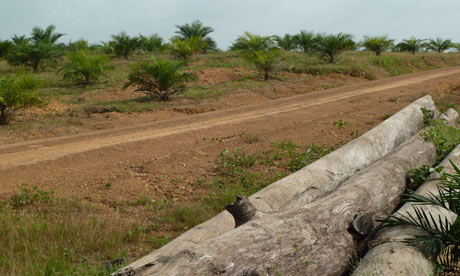Land 'grabs' to beautify Monrovia for VIP meeting reflect crisis across Africa” where rush for resources is threatening peace
By Silas Siakor

Large parts of the last great primary forest of Liberia have vanished to make way for palm oil producers. Photograph: Anne Chaon/AFP/Getty Images
As David Cameron joins the UN high-level panel in Monrovia” Liberia” this week to discuss how the world will address the state of underdevelopment and poverty in which so many countries languish” some of the city's poorer residents are receiving a lesson in what development might mean for them.
As part of a beautification effort intended to welcome Cameron and the other panel members to Liberia” dozens of families in once-affluent parts of town have had their houses bulldozed in the past few days. Acting on behalf of wealthy landowners” some of whom fled abroad during the war” the city government has used the pretext of the UN meeting to carry out the evictions” putting the construction of hotels and restaurants before the lives of some of the city's most vulnerable residents.
Unfortunately” these cases are not unique. In rural areas” hundreds of communities have had their land leased to multinational palm oil producers without their consent” with some discovering this only when bulldozers began clearing away the forests that surrounded their towns. When the contracts were signed” the government assured investors that the land was mostly uninhabited and unused. Faced with a local and international backlash” and upon realising the land they were granted is occupied by tens of thousands of Liberians (pdf” pp45-47) – who very much consider themselves the owners of that land – the companies have been forced to slow their operations and re-evaluate their plans.
At the heart of these conflicts is the crucial question of who owns land in Liberia” and the country is not alone in its struggle to come up with an answer. In many African countries” rural communities that have hunted” farmed and worshipped in the same place for centuries are considered de facto squatters under national law. No matter how deficient it may be in providing services such as education and healthcare to rural populations” in these cases the state technically owns nearly all the country's land” leaving communities subject to dispossession” and resources extracted against people's wishes” at any moment the government sees fit.
One result of this circumstance has been the wave of massive land deals that has swept Africa in the past five years” with a myriad of international investors cutting deals in national capitals for giant swaths of arable” populated land for export-oriented agricultural plantations.
A world that is concerned with generating equitable and peaceful economic growth in underdeveloped countries cannot afford to leave land rights for poor people off the agenda. In Liberia” where land reform has been under way for several years” the stakes are high. Land disputes threaten to damage the country's hard-won peace” and while it appears certain that rural communities will be granted some form of official ownership in the near future” neither those who live inside agricultural concessions nor urban “squatters” are to be included in the reformed law. This oversight will almost certainly entrench grievances that could explode under certain conditions.
The struggle over land ownership is crucial to development. Communities and urban dwellers who are not protected from dispossession or eviction exist in a perpetual state of insecurity – if they are forced to leave their home for the benefit of foreign investors or local elites” they will often end up in slums or crowded in centralised towns that lack basic services or a functioning civil structure. This is a recipe for crime and hopelessness.
In the long run” communities that do not hold the title for their land will be less likely to meaningfully invest in it” and have no legal recourse to claim benefits from resource extraction that takes place in their backyards. Given the poor track record of many African governments in managing public funds” it would be wise to decentralise development by giving communities the right to earn and spend some of the money themselves. Recognising and formalising customary land rights – and protecting those rights in law – should be a first step in the economic and social transformation agenda being debated by the high-level panel.
Decades of international expenditure on development have produced less than ideal results. It is time for a new approach. Granting legal land titles to poor people will foster stability in society and protect marginalised constituencies from conflict-inducing land grabs at the hands of powerful elites and extractive industries.
With the help of the world's wealthier nations” rural people who own their land will have the chance to benefit from better farming techniques” increasing their competitiveness. On the other hand” if they accept the presence of foreign investors” it will be on fair terms. In the city” slum dwellers who have the titles to their land will be able to reap the financial rewards of development in their neighbourhoods – hopefully turning them into consumers.
As the high-level panel guests arrive in Liberia” they would be well served to pay attention to the vacant” rubble-filled lots that they will pass in their motorcades. Perhaps the lots can serve as an example of what must change if the chronic state of underdevelopment in Africa and throughout much of the world is to have any chance of improving after 2015.
• Silas Siakor is director of the Sustainable Development Institute” Liberia” and winner of the Goldman Environmental Prize
